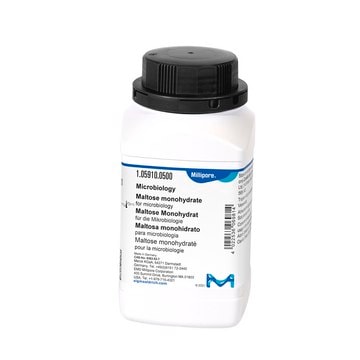M5895
D-(+)-Maltose monohydrate
≥98% (HPLC), BioReagent, suitable for cell culture, suitable for insect cell culture
Synonym(s):
4-O-α-D-Glucopyranosyl-D-glucose, Maltobiose
About This Item
Recommended Products
biological source
potato
Quality Level
product line
BioReagent
Assay
≥98% (HPLC)
form
powder
optical activity
[α]20/D 128.0 to 132.0 °, c = 4% (w/v) in water + trace NH4OH
technique(s)
cell culture | insect: suitable
cell culture | mammalian: suitable
impurities
≤0.3% glucose
≤1.0% maltotriose
color
white
useful pH range
5.0-7 (25 °C, 180 g/L)
mp
102-103 °C
solubility
H2O: 50 mg/mL
application(s)
agriculture
storage temp.
room temp
SMILES string
O.OC[C@@H](O)[C@@H](O[C@H]1O[C@H](CO)[C@@H](O)[C@H](O)[C@H]1O)[C@H](O)[C@@H](O)C=O
InChI
1S/C12H22O11.H2O/c13-1-4(16)7(18)11(5(17)2-14)23-12-10(21)9(20)8(19)6(3-15)22-12;/h1,4-12,14-21H,2-3H2;1H2/t4-,5+,6+,7+,8+,9-,10+,11+,12+;/m0./s1
InChI key
HBDJFVFTHLOSDW-DNDLZOGFSA-N
Looking for similar products? Visit Product Comparison Guide
General description
Application
- Cell culture studies.
- Insect cell culture studies.
- To study the glass transition temperatures and phase relations for several saccharide-water systems.
- As medium supplement in the modified Luria-Bertani broth (LBM) medium for E. coli strains.
Other Notes
Storage Class Code
13 - Non Combustible Solids
WGK
WGK 1
Personal Protective Equipment
Certificates of Analysis (COA)
Search for Certificates of Analysis (COA) by entering the products Lot/Batch Number. Lot and Batch Numbers can be found on a product’s label following the words ‘Lot’ or ‘Batch’.
Already Own This Product?
Find documentation for the products that you have recently purchased in the Document Library.
Customers Also Viewed
Our team of scientists has experience in all areas of research including Life Science, Material Science, Chemical Synthesis, Chromatography, Analytical and many others.
Contact Technical Service







